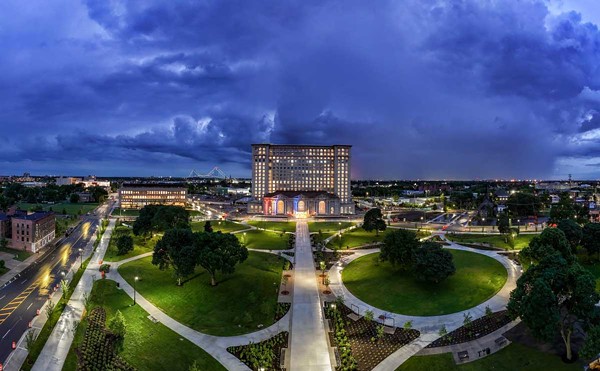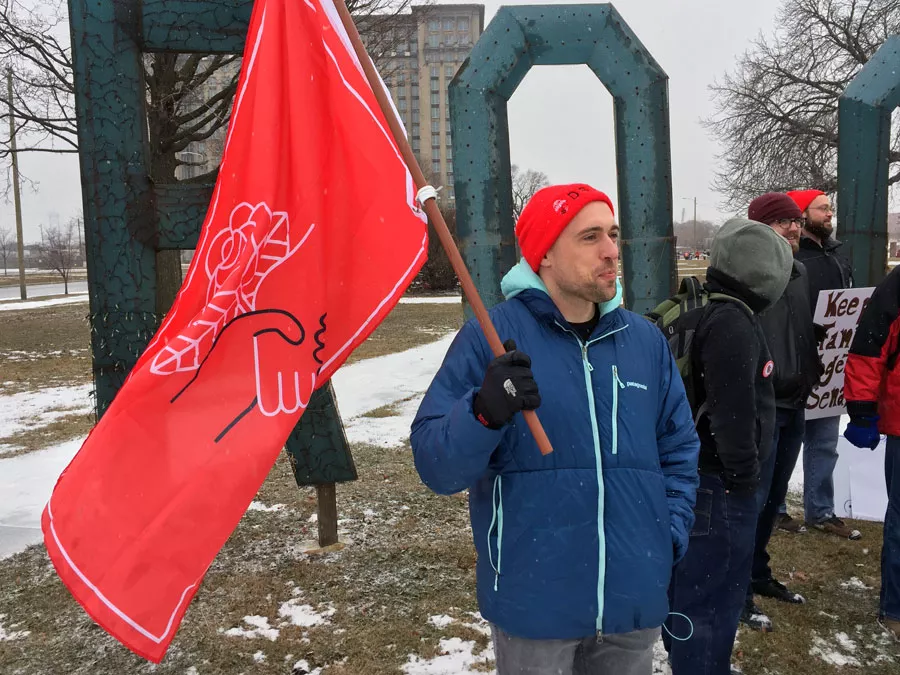
On the first Saturday of the year, more than 50 people were packed into a fluorescent-lit room at the Royal Oak Senior Center with the ultimate goal of overhauling the country's economic order. The crowd was mixed in age — about a third of its members looked to be senior citizens and a third appeared to be in their 20s. Across the spectrum, quite a few people wore flannel.
The gathering was a general membership meeting for the Greater Detroit Democratic Socialists of America, but its proceedings hardly suggested a revolution was afoot.
Instead, leaders of the DSA chapter outlined modest initiatives that, at best, would help address some of the negative effects of capitalism.
An early-30s, burly guy in a beanie and red flannel described a plan to impose stronger oversight on for-profit charter school authorizers. The group's co-chair announced the next date DSA members would escort women seeking abortions to a local clinic where a small crowd of anti-choicers routinely gathers to shame them. An elder member outlined a plan to get young, newly registered voters to cast ballots in a primary election before going off to college, so they can vote absentee in November.
An election was also due to take place at this particular Saturday meeting. The group's steering, or leadership, committee had a vacancy.
"I feel strongly about working for marginalized populations and working toward social justice," said a young social worker vying for the slot.
By the time she wrapped up her pitch, several latecomers had gathered near the entrance.
"You can sit down, I'll gladly move my stuff," the co-chair, Catherine Hoffman, called out from the center of the room with a smile. "We're all socialists, we're friendly."
To that end, both the young social worker and her competitor went on to be elected to the steering committee after an elder member pointed out that the group's bylaws allow for additional leaders. There are now 17 people leading the chapter — 9 are male and 8 are female. The equitable makeup of the committee belies the demographics of the room, which is three-fourths male (and overwhelmingly white).
The rest of the formal meeting is comprised mostly of votes on more mundane matters. David Bonior, a Democrat from metro Detroit who served as House minority whip in the '90s, is releasing a memoir and has asked that the organization host a book signing on his behalf. The other DSA co-chair, David Green, a man with a trim salt-and-pepper beard who wears a tucked-in button up and jeans, explains that Bonior is known for having sponsored legislation that raised the federal minimum wage.
The young membership isn't sold on helping him.
"What does he say about socialism in the book?" asks a young woman. Nothing.
"What would it entail, resource-wise?" asks another member. Very little.
"Is there a donation to the organization?" No, but proceeds from the book will go toward supporting young people in activism.
After nearly 10 minutes of this, a vote is held. The ayes have it.
Two years ago, it would have been unfathomable for a book signing for a former high-ranking Democrat to illicit so many questions. But the back-and-forth is emblematic of the position the DSA finds itself in today: Its membership has more than quintupled, and many of those who've joined its ranks are young, idealistic, and unwilling to support party-line Democrats, or, to use a term that has become a pejorative — centrists.
In light of that, the coiffed politician in a pinstripe suit who slinked in mid-meeting doesn't look like he's going to have much luck with the crowd.
"I'm the only Democrat state senator from Macomb," Steve Bieda, who's mounting a Congressional bid and has come seeking support, tells those gathered. "I share your values."
At a table just feet from the state senator, a young member fiddles with his phone.
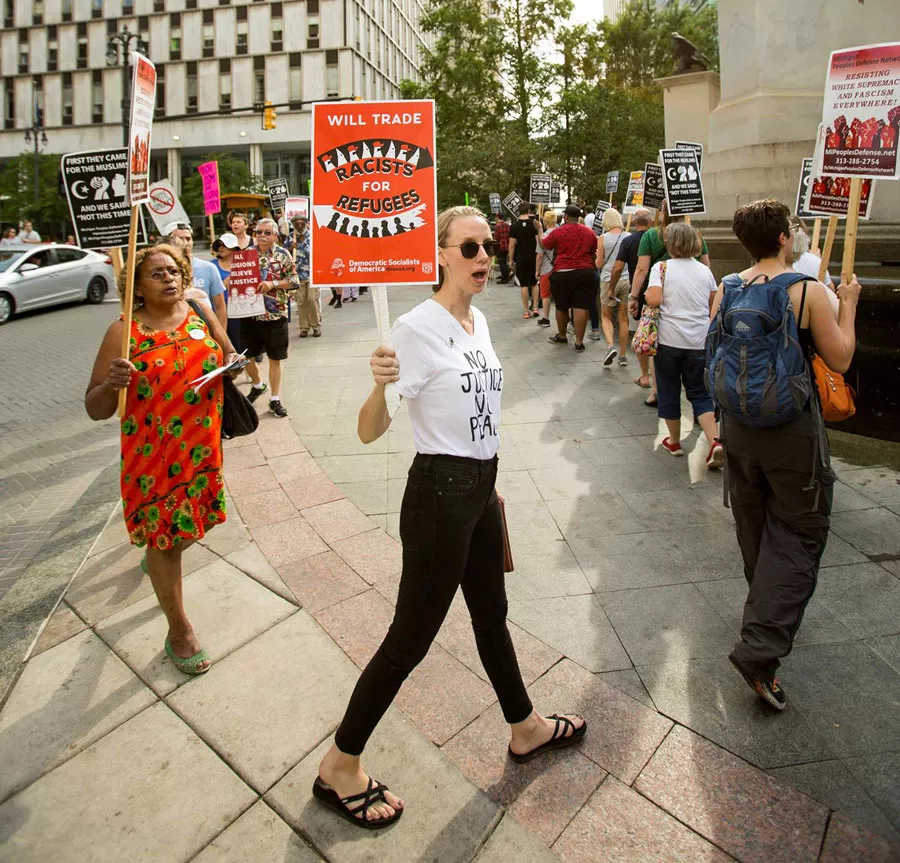
Packed meetings are a relatively new phenomenon for the Greater Detroit DSA. Nationally, the organization has seen a tidal wave of new membership since Vermont Senator Bernie Sanders, a self-described democratic socialist, mounted his presidential bid in 2015. DSA is now the largest socialist organization in the country, with 32,000 dues-paying members. Before the so-called "Bernie bump," DSA's ranks held steady around the 6,000 mark — the same number of people that belonged to the group when it was created via the 1982 merger of two socialist organizations that came out of the anti-war movement.
That growth has been facilitated by a tripling in the number of chapters across the country. Pre-Sanders, there were more than 30 chapters nationwide — now, there are more than 100. In Michigan, a new chapter has been created in the Ann Arbor area and seeds for new chapters have been planted in Flint, Marquette, Lansing, and Grand Rapids.
Greater Detroit, one of the organization's original chapters, has seen its membership swell to about 300. While there's no official count of how many dues-paying members there were before the surge, one longtime member estimates the local chapter peaked out at 100 people. Others say the group's monthly meetings used to draw just over a dozen people. Now there are usually 40 to 75 people on hand.
Among the new recruits is Naomi Burton, a 28-year-old P.R. rep who grew up in Ann Arbor, and credits Sanders' candidacy with helping shape her once-amorphous political beliefs.
"It was the first time I heard things like Medicare for all, free college tuition, universal [basic] income," she says. "Bernie introduced the language that made me be able to evolve my political ideologies."
Saddled with student debt and worse off than their parents were, millennials are growing dissatisfied with or outright contemptuous of capitalism.
tweet this
A mainstream Democrat until last year — or "neo-liberal" as she puts it — Burton voted for Obama twice before supporting Sanders in the 2016 Democratic primary and Clinton in the general election. After Clinton's loss, Burton looked to the Democratic party to embrace some of Sanders' ideals. But when the party failed to pivot left, instead dwelling on the reasons Clinton should have won (see: Russian interference, sexism), she began to search for an alternative.
"The Democrats put the nail in the coffin with the 'we're not as bad as him' tactic," she says. "It made me kind of take a step back and realize the party is either severely inept or disconnected from their voters, or, more obviously — they don't want to back progressive policies because they're beholden to special interests who are hurt by those."
In the DSA, Burton says she found a group "actually committed to shifting power from capital to people."
"It was just kind of that simple ideology that is so difficult to land with Democrats, that really clicked with me," she says.
Smart, driven, and eager to make a difference, Burton dove headfirst into socialism, gaining a deeper understanding of the underpinnings of the ideology through texts like The Communist Manifesto and a recently released book by the leftist Jacobin magazine, The ABCs of Socialism. She took on leadership roles within the DSA, getting elected to its steering committee and becoming co-chair of both its communications and reforms committees.
As her worldview began to evolve, so too did her daily choices. Once a near-bumper-sticker-level devotee of NPR, Burton has started turning to leftist media outlets, like the D.C.-based progressive news "co-op," The District Sentinel. She watches less TV and avoids cable news entirely. When she does sit down for a show, she opts for programs that "highlight our dystopian reality," like Shark Tank. This month, her newfound ideology will give way to a full-on lifestyle revamp: Burton has drastically reduced her living expenses and is leaving her job at GM to slow down — "capitalism has us going so fast," she says — and refocus her skills "toward the larger effort of equality."
"When you come to that moment of clarity when you just see capitalism as oppressing everything and everyone, standing around the water cooler feels and is kind of devoid of meaning," she says.
Burton's sentiments reflect a newly discovered trend among millennials. Saddled with student debt and worse off than their parents were, the age group is growing dissatisfied with or outright contemptuous of capitalism and, by extension, has a far more favorable view of socialism than older generations. Numerous polls have identified this phenomenon, but one need look no further than the overwhelming young adult support for Sanders' presidential bid: More than 2 million people under the age of 30 voted for him in the primaries and caucuses of 2016, more than all of Donald Trump's and Hillary Clinton's votes from that age group during the primaries and caucuses combined.
It's these disillusioned young people who've propelled the DSA's resurgence and, in the process, utterly changed its face and tenor. Pre-Bernie, the group's median age was 68 — today it is 33. The new members are enthusiastic and eager to get things done, but, perhaps most importantly, they view themselves as more militantly leftist than the organization's longtime members.
As an engagement coordinator for the Greater Detroit DSA put it, the young membership has breathed "life and confusion and consternation" into the once obscure organization.
"They've been doing things the same way since the '80s and it sometimes rubs people the wrong way," says 33-year-old Jason Hackney. "We found that with this huge influx of young people a lot of things that we want to do get bottlenecked. Like, we're having all these issues over immigration. Where are we? Why aren't we doing anything? So, there are some growing pains."
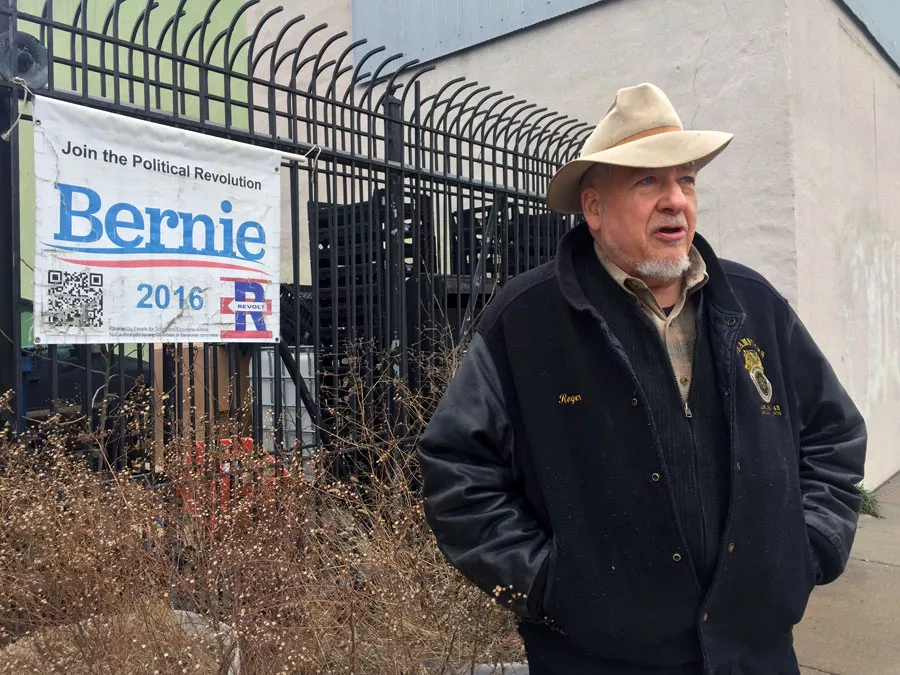
In its leaner years, DSA was a little-known group that wielded little influence. Since its founding during the Reagan era, it has sought to strengthen the "left wing" of the Democratic party and promote progressive and socialist causes. Most of its members are socialists who believe in doing away with capitalism and bringing key industries and enterprises under social, or democratic, control. The idea is that true democracy cannot be achieved through only political democracy, as our current system operates — the economy must be democratized as well.
But the Democratic party, unwilling to embrace socialism perhaps for its association with authoritarian regimes, has drifted rightward during most of DSA's 35-year history. In the '90s, it saw then-President Bill Clinton gut welfare and expand the prison system. Party elites favored neoliberal ideas until last year.
To Bhaskar Sunkara, the editor of Jacobin and a DSA leader who worked in the group's national office a decade ago, before the Bernie wave, the organization felt "bleak" and "utterly irrelevant."
Here in Detroit, a former chapter president who's been with the group since it was created says he and other veteran members stuck it out "because, existentially, one wishes to struggle against the forces of evil."
"I was hopeful that at some point there would be an opening and if one wasn't to organize one would miss the opening," says Roger Robinson, a 72-year-old former labor organizer who helped found DSA's predecessor organization, the Democratic Socialist Organizing Committee. "So to an extent, I had to wait a long time, but when that opening came, there was an organization that ... was able to facilitate the organization of [tens of thousands of people]."
Part of the reason that's possible is because the DSA is set up as an "ecumenical, multi-tendency" organization that represents a broad range of leftist interests, as opposed to a political party with a distinct platform. Its membership has historically ranged from New Deal Democrats, or people who would prefer to expand the welfare state, to communists at the more extreme end of the spectrum.
With the goal of a socialist state seemingly unattainable for the immediate future, the group's members coalesce around reforms like those outlined by Sanders, which generally aim to weaken the power of capital and enhance the power of working people. DSA's current agenda includes Medicare for all (otherwise known as universal or single-payer health care), free higher education, and a $15 minimum wage. Historically, the organization has supported cutting military spending to fund social programs and has opposed welfare "reform" and neoliberal globalization, which it sees as having strengthened corporate elites while weakening the working class, and by extension, the labor movement through which so many past societal gains have been achieved.
But the organization has never had much influence in any of those areas. Before the Bernie wave, the group's activities mostly involved attending protests and events planned by others as a show of solidarity, according to a Nation article published last year.
At the state and local level, Robinson and other Greater Detroit chapter leaders say they were able to have some influence during the "bleak" years by using their small numbers strategically. The chapter credits itself for the passage of living wage ordinances in various cities before the Michigan legislature rendered them void, and says it has helped elect about 20 candidates who shared some of their ideals to mostly state level offices. All but two of those candidates were Democrats who did not openly identify as socialists.
"We try to put people in office who meet some minimal threshold of what we consider broad coalition progressive politics, if not explicitly socialist politics," explains Robinson, who oversees the group's electoral efforts.
Historically, that has meant backing leftist candidates in primary elections and more centrist Democrats in general elections in contested, or swing, districts.
"Anything that stops the fascist hoard from continuing to roll over us is a victory," he told prospective electoral committee members at the group's first meeting of the year. "Even a witless, pedestrian slugworm Democrat at this moment in history is a victory — anything that rolls back the reactionary right wing forces and stops their ... steamrolling of the welfare state."
But this strategy has been a particularly thorny issue as the DSA absorbs a younger, more radical contingent. Nationally, the organization requires candidates to identify as socialist to receive an endorsement, and several young Detroit members who spoke with Metro Times questioned why their local chapter even gets involved in races where a leftist candidate can't win.
Negative attitudes about socialist candidates have been thawing, and nationally, 15 DSA members were elected to seats last year.
tweet this
"A socialist organization getting behind centrists or neoliberal candidates waters down our goals and loses us trust in the community," says Nick Hayes, a 20-year-old who joined the group last year and co-chairs its reforms committee. "It expends our organizing energy on campaigns that have no firm policy stances and makes us complicit in allowing the Democrat establishment to continue forcing corporate candidates down our throats."
The debate, which is swirling as the 2018 midterms approach, represents just one of several fissures that have emerged in the organization's new iteration. On the electoral front, some members would like to see the organization demand that the candidates it endorses openly identify as socialist. Separately, some elder members were dismayed last year when a resolution in support of the Palestinian-led Boycott, Divestment, and Sanctions movement, which is against the Israeli occupation of the Palestinian territories, passed at the DSA's national convention. The move prompted founding member Jo-Ann Mort to pen an essay suggesting that the organization had been commandeered by a "younger, more 'anti-imperialist' left that sees the centrist politics of their socialist predecessors nearly as much a part of the problem as the more mainstream democratic leaders." Mort writes that today's DSA is "not the DSA that was founded by Michael Harrington" — who was a supporter of Israel. If true, there are some who may not view that as a bad thing. A recent piece in Counter Punch criticized the old DSA as representing "socialism within the bounds deemed acceptable by the liberal wings of the Democratic Party and AFL-CIO officialdom."
The fractures between new and old members are evident in long-standing chapters like Detroit's, where a small group of elder members has helmed the ship for decades. In my interviews with younger members, this faction was occasionally referred to as "the legacy members," but sometimes, less kindly, as "the old guard."
In some chapters, Hayes says new members have orchestrated "full-blown coups" to usurp power from the elders.
"A lot of people are just blowing it up and getting rid of them because they're running into misogyny and sexism and zionism among older members," says Hayes.
In the absence of an election of chapter leaders since the Bernie wave, Hayes and Burton have created a reforms committee to restructure the Detroit chapter to better harness the potential of its new membership.
At a recent meeting of the committee, five people ranging in age from 20 to 35 gathered around a member's Ferndale dining room over plates of Mediterranean carryout to discuss creating a sexual harassment policy and the pros and cons of procedural norms like Robert's and Rusty's rules of order.
The conversation eventually turned to Steve Bieda, the politician who turned up at the first meeting.
"Who was the guy who came from Macomb?" asked Hayes.
"Steve Bieda, the [Senator]," said his comrade, Stacey Walters. "Like, I'm the only Democrat in Macomb, vote for me! Mr. 'Let's keep the military industrial complex!'"
The group agreed they wanted fewer drop-bys from random Democrats, who often speak and take questions at the chapter's monthly meetings in hopes of gaining its support. The reforms group would prefer to instead use the time to break out into issues-oriented focus groups.
We ask, then — who let that guy in?
It was the legacy members.
"It's the older guy thing of wanting to feel like you have connections and stuff with politicians and all that so it's like come speak to this group — even if you're not totally ideologically in line with me — then I'll gain influence," says Hayes.
"One second, do you want to just vote on that real quick?" he asks, stopping the conversation. Like make that the formal recommendation of this committee?"
"All in favor to, uh, recommend to the steering committee that we are going to have those meetings like we had in January say aye," says Burton, referencing the new format of issues-focused meetings.
Five voices say "aye."
"All in — what is it?" she asks, still getting the hang of how to pass motions.
"Opposed," Hayes offers.
"All opposed?"
Silence. The motion carries, setting the stage for what the young members hope will mean a better engaged membership.
Disagreement is inevitable in a "large-tent" organization without a strict party line. But the democratic nature of the DSA has helped the group successfully incorporate some of the principles and strategies of its new members, even if there's been some tension in the process.
"The younger members' displeasure [with centrist policies and candidates] is legitimate and appropriate, but their experience is limited, and some of their critique, while intellectually sound, is not operationally, strategically, or tactically valid," says Robinson. "That's part of the dance that we have to go through as to how do we absorb different points of view and how do we integrate them into an organization that functions. I think we will pass the test."
Co-chair Hoffman, who has been with the group since 2000 and, at 37 years old, finds herself straddling the divide between new and old, says she's "proud" of how well the group has managed the influx of new members.
"There's always going to be a few hiccups when you get all these new people together to work together, but generally our older members who've been doing this for years are really excited to bring in new people and show them the ropes," says Hoffman. "And our younger members are doing a pretty good job of listening and trying to figure out where the older folks are coming from."
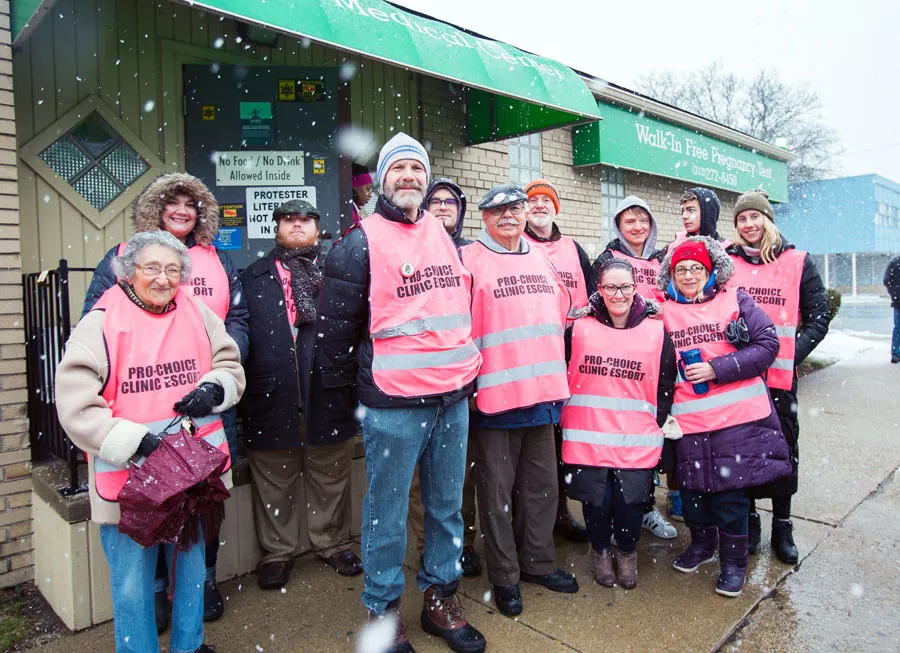
DSA members who attended the Greater Detroit chapter's February meeting were greeted by rows of folding chairs. Despite the recommendation of the reforms group, a Democrat Congressional hopeful was to speak to the chapter. Rashida Tlaib, a former state representative from Southwest Detroit, is running for the seat left vacant by John Conyers.
Most of the folding chairs sat empty, as just over two dozen members showed up. Some of those absent later said they thought the meeting's format was to blame for the weaker-than-usual attendance.
After delivering a 20-minute pitch that checked off quite a few progressive boxes — Tlaib works at the Sugar Law Center for Economic and Social Justice, and took on corporate welfare and polluting companies as a state legislator — the membership started firing off pointed questions to gauge Tlaib's feelings on socialism.
"DSA nationally as an organization has been looking to recognize socialist candidates — people who are running as open socialists. Will you run as a socialist?" asked a young woman.
"Yeah, um it's, it's — we got to win," Tlaib said with a laugh. "Honestly let me tell you, and somehow we got to hijack that back, but people have tainted that word, and honestly, going door to door, regular voters don't really understand. They don't even understand when I talk about the Green Party ... [they think it's] anti-Democrat."
She went on to describe the board at the Sugar Law Center as being comprised of "pretty much socialists" whom she "loves." Tlaib said she did expect to be called a socialist by her opponents, but hearing that she may be the subject of so-called "red-baiting" tactics was of no comfort to the crowd. The organization has taken great pains to disassociate from the authoritarian regimes it says have abused socialism and tarnished its name. The "democratic" in DSA is intended to distinguish its brand of socialism from the Marxist–Leninist inspired socialism that allowed for dictatorships. DSA's emblem includes a red rose, which has historically been an important symbol for anti-authoritarian groups.
"When the opposition calls you a socialist, what will you do?" an older gentleman asks.
"I say if I was, what would be wrong with it?" Tlaib says. "And I explain, the fact of the matter is the labor movement was founded on socialism ... I try to explain that history."
Another member presses her further on the issue — pointing out that Sanders, who openly identified as a democratic socialist, ran a successful campaign in Michigan.
"While I agree with you it's a pretty dicey conversation when you go door to door, I do think that because you're running in Detroit, I think in the context of what happened in Michigan with Bernie, you should just give that some more thought," the DSA member says.
Tlaib reiterates that "there's just a sense of fear because we want to win."
Negative attitudes about socialist candidates have been thawing as the DSA's popularity grows, and nationally, 15 DSA members were elected to seats on everything from school boards to state legislatures last year. That's on top of the 20 DSA members who already held some form of elective office. This year marks the first opportunity for a DSA member to secure a Congressional seat since the organization's resurgence.
After Tlaib leaves, the group has to vote on its candidate endorsement strategy for the coming election. The young woman who kicked off the socialist inquiry suggests that there be two tiers of support for candidates, with those who openly identify as socialist receiving more help from the group. The suggestion doesn't go anywhere and the same strategy that the group has used in years past is re-adopted, opening the door for the Greater Detroit DSA to continue backing centrist Democrats in close-contest general elections. The motion passes with many young members who oppose this tactic absent for the vote.
But there are a flurry of new initiatives that come out of the meeting as the group expands its efforts to reflect some of the ideas of its new members and to utilize the additional support they can provide. The chapter votes to create a working group to advocate for single-payer health care (state representative Yousef Rabhi will soon introduce legislation to create a universal system in Michigan, while a Medicare-for-all campaign is ramping up on the national level), and a socialist-feminist working group and environmental justice group are also approved.
When the meeting adjourns, about a dozen members head to a coffee shop for something that's billed as a "socialism happy hour" but is really just a hang out ("Capitalism is isolating" and "socialism is social" are common refrains among the group). The day's activities extend into the late afternoon, when half a dozen Detroit DSA members brave below-freezing temperatures to stand in solidarity with immigration advocates at a demonstration for the Deferred Action for Childhood Arrivals, or DACA.
And so, the new Detroit DSA marches forward, with a little bit of old, a lot of new — and more powerful than ever before.


